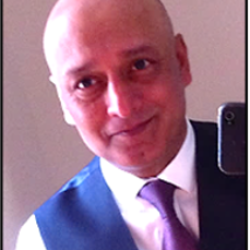Meet the academic: Dr Surinder M Soond
Dr Surinder M Soond, Lecturer and Principal Investigator in Immuno-Oncology, shares why he’s passionate about immuno-oncology and his career highlights so far.

Please could you introduce yourself?
Hello, my name is Surinder. I’m a Lecturer and Principal Investigator in Immuno-Oncology in the School of Biosciences and Medicine at the University of Surrey and an Honorary Professor at Sechenov University in Moscow, Russia.
Why did you become an immunologist?
I became very interested in immunology because I’m fascinated by the immune system and how it defends the human body against disease and can sometimes even be the cause of it.
How did you become an immunologist? (university or industry training?)
I developed my research interests (academic and practical) in immunology and oncology through working as a scientist at various institutes around the world.
Once you qualified, where did your career take you and were there any highlight moments?
That’s a huge question. I’m not sure if I can describe myself as a ‘qualified’ immunologist, since it's an area that a scientist grows with (just like any other academic subject) over the span of their career. Having said that, I enjoyed working as an immunologist at the Medical Research Council (MRC) Laboratory of Molecular Biology at the University of Cambridge and at the National Jewish MRC in Denver, Colorado. Both were brilliant positions that offered up many challenges but helped to develop my curiosity in several aspects of immuno-oncology.
How and why did you become an academic?
I graduated, did my PhD and hopped on the ‘postdoctoral treadmill’ for a few years. I really like science and have done from a very young age – it’s fuelled my curiosity in many aspects of life.
What excites you most about your current role?
The academic freedom and the collegial atmosphere in which it is allowed to develop and take effect – it's very exciting.
The idea of putting all of my research experience together and using it to develop key areas of immuno-oncology is another driver and one of the key factors that keeps me motivated and inspired. Using my scientific experiences to shape the careers of a new generation of upcoming scientists is also another big reason.
What is your specific area of expertise, and why are you passionate about it?
My expertise is molecular signal transduction pathways in cancer progression – I totally love this area! It’s all about analysing the cause and effects of signals generated from outside (or the inside) of the cell and what their contributions are to normal cellular function or during disease. I really like it because it challenges me to think harder from a perspective that usually involves unravelling very complex molecular signalling pathways and learning what points can be targeted for novel therapeutic development.
Describe cancer in three words (or one sentence)
A disease state that we have demonstrated a high level of success in being able to combat.
Why should people study immuno-oncology?
So that they can appreciate a greater understanding of what contribution the immune system in humans makes towards the development of many cancer types and how this relationship can be targeted to help the body overcome cancer progression.
What are you looking for in a student?
- Curiosity
- Motivation
- A big smile!
Do you have any advice for prospective students?
Never give up – dream big and follow your dreams!
Is there a specific memory of your time at Surrey (so far) which stands out for you?
I’m still settling into my role at Surrey and to life in the UK, it’s a huge period of adjustment from the life and mindset that I had in Russia. Following my arrival in July, I visited the campus and walked around the lake – it left a lasting impression. To have such a beautiful and tranquil piece of landscape so close to our department is a real plus. I frequently walk around it with a quiet and reflective mindset, to free up some head space when needed.